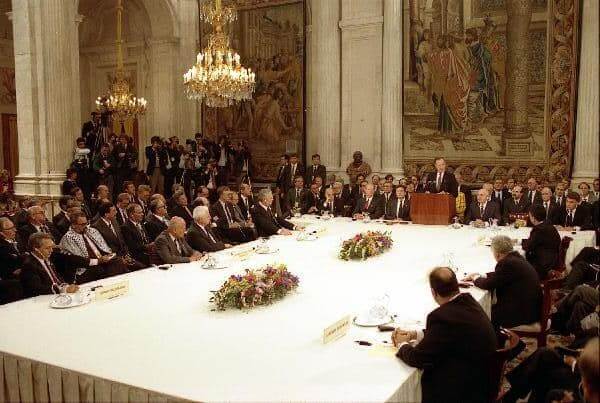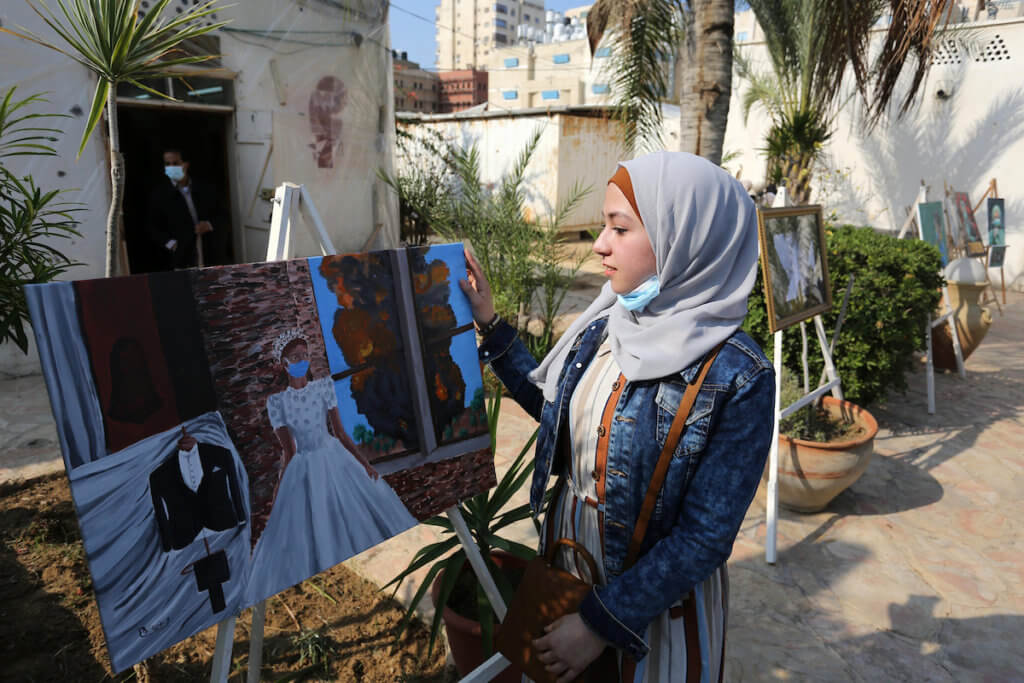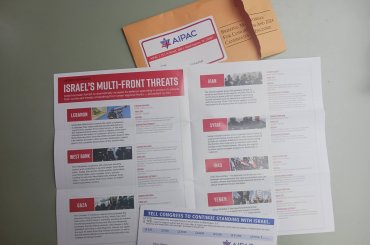Palestinian artists attend an exhibition entitled “Corona and Art,” organized by the Arts & Crafts Village, a center that promote artists and Palestinian heritage, in Gaza City on November 12, 2020. (Photo: Ashraf Amra/APA Images)
The Latest:
- 73,697 Palestinians tested positive for COVID-19; 64,937 recoveries; 623 deaths
- Of Palestinians who tested positive, 51,698 are in the West Bank; 12,183 are in East Jerusalem; 9,816 are in Gaza
- 322,695 Israelis tested positive for COVID-19; 310,605 recoveries; 2,716 deaths
The cavalry is coming, for some
On Thursday Israel announced that it singed a deal with Pfizer to supply vaccines with a reported 95% effective rate. The roll out is expected in January and comes after Israel managed to drop its rates of new infection with a second broad scale lockdown over the last few months. Israel now has around the same number of active infections and daily new cases as it did in June.
Palestinian cases, however, are on the rise. The numbers are roughly the same as in August, just before new cases peaked in September. Most of the growth is coming from Gaza where around 12 localities are designated as hotspots and under lockdown, however, the rest of the territory reopened a few weeks ago and classes have been back in session for nearly a month. There are mask protocols in place at schools and there is a nighttime curfew across the region, but businesses have reopened, and of course population density is a driving factor for the spread of disease.
Zooming in: On Wednesday Gaza hit a record of 300 new COVID-19 cases “the highest number in a 24-hour period since the beginning of the outbreak,” the WHO said in the latest situation report.
The hard numbers: The rapid increase in new cases comes as the UN agency responsible for funding services for Palestinian refugees—including health services—announced it is on the verge of running out of money. “The number of refugees who have contracted COVID-19 has jumped from fewer than 200 in July to nearly 17,000 as of this week,” the UN reported.
Due to constraints from the Trump administration ending funding, and new demands from the pandemic, UNRWA said it has two weeks before it runs out of money.
“If we do not have additional funding by the end of this month, November, then we will have to enact really disheartening measures that will affect the salaries of our frontline 28,000 UNRWA staff, in the middle of a global health emergency,” UNRWA spokesperson Tamara Alrifai said.
Gaza will still be in line to receive a COVID-19 vaccine through the COVAX initiative, which will immunize 20% of the Palestinian population, focusing on older people and those with preexisting conditions. This week the Palestinian Authority created a National Coordination Committee to distribute the COVID-19 vaccine.
Palestinians remember when Saeb Erekat’s keffiyeh almost sank the Madrid peace talks
Yumna Patel reported on the passing of senior Palestinian negotiator Saeb Erekat who died of complications related to COVID-19 after falling ill over a month ago.
“The office of Palestinian President Mahmoud Abbas, to whom Erekat was a long time advisor and colleague, announced Erekat’s death in a statement early Tuesday afternoon, saying the ‘the departure of the brother and the friend, the great fighter Saeb Erekat, represents a big loss for Palestine and for our people.
‘We feel deep sorrow for losing him, especially at such difficult times the Palestinian cause is living through,’ the statement said.
Erekat’s family released a statement saying he ‘lived a life full of thought, love, forgiveness and peace and he will be dearly missed.’”
Erekat’s death leaves major diplomatic hurdles for the Palestinian leadership who will have to contend with a new administration that could seek to restart high level peace talks, without the most senior Palestinian diplomat. The worries percolated as news of his passing broke this week.
“We’ve already seen the informal death” of the peace process, former PLO official who worked alongside Erekat, Diana Buttu, told Patel, “but his passing will signify the formality of it.”
This sentiment is tracking across the media landscape. “And if there are ever again going to be serious negotiations between Israel and the Palestinians, they are going to have to find another one,” Aaron David Miller told the Washington Post.

President George H.W. Bush addresses the Middle East Peace Conference at the Royal Palace in Madrid, Spain on October 30,1991. (Photo: David Valdez/U.S. National Archives and Records Administration)
On social media, mourners shared an old photograph of Erekat, then 36, in the Jordanian-Palestinian delegation for the opening of the Bush administration led Madrid peace conference in 1991. Erekat sported a black and white Palestinian scarf or a keffiyeh. At the time, the display caused major waves. Israel’s then Prime Minister Yitzhak Shamir threatened to not enter the room if Erekat was there.
The AP reported at the time:
“‘I am really surprised that this keffiyeh that is a symbol of peace and love and Palestinian culture provokes (Israeli Prime Minister Yitzhak) Mr. Shamir,’ Erekat said.
‘This keffiyeh is worn all over the occupied Palestinian land. … A symbolism of my nation, and if this provokes them, they really need a lot of reconsideration and rethinking.’”
Incidentally, a young Benjamin Netanyahu was a spokesperson for the Israeli delegation and told reporters, ″The idea is not to make provocations and not to make a spectacle of this.”


